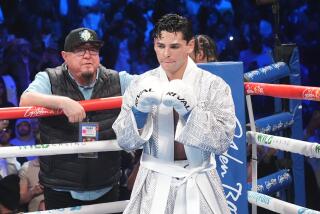Phony Business Part of Probe
The FBI and an undercover New York City police detective opened a bogus Las Vegas business more than a year ago as a front to infiltrate the boxing world, according to documents and interviews.
Nevada business records show that a company called YGJ & Co. was established Dec. 4, 2002, as part of a wide-ranging federal investigation into whether professional prizefights were fixed by anyone associated with the promotion of the fight. The investigation, which began at least 20 months ago, came to light last week when the FBI raided the Las Vegas offices of one of boxing’s premier promoters, Bob Arum.
While many details of the investigation remain under seal, authorities have disclosed that it involves a New York City detective posing as a businessman as well as a convicted murderer and onetime boxer who has used his connections to help the probe.
The detective, using the alias Frank “Big Frankie” Manzione, opened the YGJ business as a purported front for dealing in stolen merchandise, a source close to the investigation said Friday.
The phony fencing operation apparently was designed to establish the detective’s credentials as a shady operator.
“Frank set this up to make it look like a fencing operation,” the source said. “It was used as a cover [for the investigation].”
The business operated out of a small industrial park at 337 Meade Ave., protected by razor wire and two Rottweilers.
Brian Elliott, who runs an adjoining business at the site, said he saw unidentified men on Thursday unloading rack after rack of clothing with Tommy Hilfiger labels from the phony business into a truck. Still inside the YGJ building, he said, was a brand new silver Mercedes, a new white SUV and two Harley Davidson motorcycles.
A source close to Arum said the promoter still believed the investigation had more to do with one individual’s transgressions outside of boxing than fixing fights. “There is no benefit to fixing those fights anyway. Nobody bets on them,” said the source.
The source added that Arum was cooperating with authorities and that federal agents returned everything seized in their search the day after it occurred.
Arum has fired one of his employees since the scandal broke.
Meanwhile, interviews and documents obtained Friday shed light on an April 27, 2002 fight that drew the attention of investigators who suspected a possible fix.
In the light-heavyweight fight at the Arrowhead Pond, Joey Torres knocked out Perry Williams 39 seconds into the second round. Torres is a convicted murderer who had just been released from prison and was attempting to launch a professional boxing career at age 41.
Williams knocked Torres down in the first round but then failed to pursue his advantage. Williams was subsequently knocked down twice in that round. The fight was stopped after Williams went down a third time.
Fans in attendance cried foul, and U.S. Sen. John McCain (R-Ariz.), a vocal critic of boxing, wrote a letter to the California Athletic Commission demanding an investigation. He cited rumors that Williams had been paid $200 to lose the fight deliberately.
The commission investigated and concluded that there had been no fix.
“These were just two very terrible fighters,” Rob Lynch, the commission’s executive director, said Friday.
Both boxers were subsequently placed on a national suspension list for “lack of ability,” Dean Lohuis, the commission’s chief inspector, who conducted the investigation, said at a 2002 hearing. Neither boxer has fought since.
The FBI used Torres to help an undercover detective infiltrate boxing circles, including Arum’s Top Rank. Last week, the FBI raided the Las Vegas office of Top Rank, which promoted the Williams-Torres bout.
Torres is in Men’s Central Jail in Los Angeles, awaiting return to prison following the reinstatement of his murder conviction. Neither he nor Williams could be reached for comment Friday.
Lohuis said earlier this week that the fact Williams got up after the first two knockdowns convinced him there was no fix.
“If you are really there to throw the fight, why get up?” the inspector said. “If he hadn’t gotten up, I would have thought differently. I think he was just a terrible fighter.”
In a phone conversation with Lohuis in 2002, Torres denied wrongdoing, according to state records: “No, I never offered [Williams] anything. I never spoke to the man. I would never do that. That is not my character.”
Williams was Top Rank matchmaker Bruce Trampler’s second choice to fight Torres, after the first opponent dropped out.
“Seeking an even match, I looked for the worst opponent I could find for a guy who was one week shy of his 42nd birthday,” Trampler said in a letter to the commission in June 2002.
In the letter, obtained Friday, Trampler said he and Lohuis “laughed and agreed that, either way, it would probably be a one-round fight because neither guy could box much.... One bum beat another bum.”
*
Times staff writers William C. Rempel and Michael J. Goodman in Las Vegas, researcher Nona Yates and research librarian Robin Mayper contributed to this report.
More to Read
Go beyond the scoreboard
Get the latest on L.A.'s teams in the daily Sports Report newsletter.
You may occasionally receive promotional content from the Los Angeles Times.










